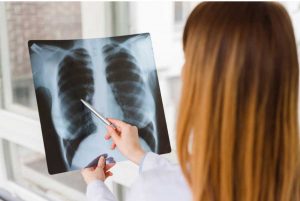A chest infection is a bacterial or viral infection of the airways leading down into the lungs, or of the lungs themselves. Chest infections can range from being mild to life threatening.
Types of chest infection
There are two main types of chest infection:
- acute bronchitis, which is the more common and less serious type of infection
- pneumonia, which is less common than acute bronchitis but more serious
Acute bronchitis
Most cases of acute bronchitis are caused by viruses, although sometimes they are caused by bacteria.
Acute bronchitis is a temporary inflammation of the trachea and the major bronchi, caused by infection. The inflammation causes swelling of the airways and a build-up of phlegm (thick mucus), which is cleared from the airways by coughing (which can sometimes last for up to three weeks).
Pneumonia
Pneumonia is an infection of the tissues of the lung. Germs that cause infections, such as pneumonia, are often passed around in the community. In some people, the germs cause pneumonia to develop.
How common are chest infections?
 Chest infections are very common and account for around one in five GP visits.
Chest infections are very common and account for around one in five GP visits.
Acute bronchitis is the most common type of chest infection, affecting about 4.5% of the population each year. The condition is most common during autumn and winter.
Pneumonia is less common, affecting just over 1% of people each year.
People who are over 65 years of age are most at risk of developing pneumonia, and the rates of pneumonia are four times higher in this age group compared with other age groups. As with acute bronchitis, pneumonia is most common during the autumn and winter months
If you have had recurring episodes of acute bronchitis or one or more episodes of pneumonia, you may be at risk of developing chromic respiratory conditions.
What causes chest infections?
The main causes include:
- A virus
- Bacteria
- Mycoplasma (a special kind of bacteria).
- Smoking
- Low immune system
Your immune system can be lowered as a result of:
- a recent illness, such as flu
- treatment for cancer, such as chemotherapy
- taking medicines or treatment that suppress the immune system
- a health condition, such as HIV or AIDS
What are the symptoms of a chest infection?
Chest infections often follow colds of flus.
The main symptoms are:
- Chesty cough – you may cough up green or yellow mucus
- wheezing and shortness of breath
- chest pain or discomfort
- high temperature (fever) of 38C or above
- aching muscles
- tiredness
- headache
These symptoms can be unpleasant, but they usually get better on their own in about 7 to 10 days. The cough and mucus can last up to 3 weeks.
Management of recurring chest infections?
Treatment for many chronic respiratory infections is based on the symptoms the person is having and the diagnosis.
Smoking cessation
If you smoke, stop immediately. Smoking aggravates bronchitis and increases your risk of developing recurrent chest infections or a chronic (long-term) condition. Giving up smoking while you have bronchitis can also be the perfect opportunity to quit altogether.
Medication
Medication may be prescribed to treat the infection. Antiviral medication may be prescribed in special situations for a viral infection. Inhaled medication may also be prescribed.
Antibiotics may be prescribed for a bacterial infection.
The use of antibiotics is usually only recommended if it is thought that you have an increased risk of developing a secondary lung infection, such as pneumonia, due to factors such as:
- being over 75 years of age and having a high temperature (fever) of 38C (100.4F) or above
- having long-term problems with your lungs or heart, such as chronic obstructive pulmonary disease (COPD) or heart failure
- having a weakened immune system (immunocompromised) as a result of a condition, such as diabetes or cancer, or due to certain types of medical treatment, such as chemotherapy
Hospitalisation
If you have pneumonia, depending on how serious your condition is, you may be treated at home or at hospital. Your GP will make a detailed assessment based on how ill you are and the likelihood that you will become more seriously ill.
Vaccinations
If you’re at an increased risk of chest infections, your GP may recommend being vaccinated against flu and pneumococcal infections (a bacterium that can cause pneumonia).
These vaccinations should help to reduce your chances of getting chest infections in the future.
Flu and pneumococcal vaccinations are usually recommended for:
- babies and young children
- pregnant women (flu jab only)
- people aged 65 and over
- people with long-term health conditions or weakened immune systems
Respiratory Physiotherapy. Physiotherapists uses a variety of treatment and techniques to help clear secretions and maximize your oxygenation which can help you recover from your chest infection quicker.
What would physiotherapy treatment for Pneumonia involve?
Respiratory physiotherapy is widely used in the treatment of chest infections because it can help to eliminate inflammatory exudates and tracheobronchial secretions, enhance gas exchange, reduce the work of breathing and reduce the risk of developing recurring chest infections or chronic respiratory conditions.
At Respiratory Physiotherapy Ireland, Our physiotherapists will ensure you receive specialised treatment for your chest infection. Depending on the severity of your chest infection your treatment may involve:

